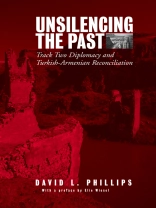The Turkish-Armenian conflict has lasted for nearly a century and still continues in attenuated forms to poison the relationship between these two peoples. The author, Senior Fellow and Deputy Director of the Center for Preventive Action at the Council on Foreign Relations and previously advisor to the United Nations, undertook, as head of the Turkish-Armenian Reconciliation Committee, to bring the two sides together and to work with them towards a peaceful resolution of the enmity that had made any contact between them taboo.
His lively account of the difficult negotiations makes fascinating reading; it shows that the newly developed “track-two diplomacy” is an effective tool for reconciling even intractable foes through fostering dialog, contact and cooperation.
İçerik tablosu
Acknowledgments
Preface
Elie Wiesel
Introduction
Chapter 1. Lessons from the Eastern Mediterranean
Chapter 2. First Contact
Chapter 3. Legislating History
Chapter 4. Empathy
Chapter 5. A Historic Step
Chapter 6. Storm of Controversy
Chapter 7. Let a Hundred Flowers Bloom
Chapter 8. Terror Strikes
Chapter 9. Reconciliation Dilemma
Chapter 10. Taking Stock
Chapter 11. Applicability of the Genocide Convention
Chapter 12. War in Iraq
Chapter 13. At the Border
Chapter 14. From Theory to Practice
Epilogue
Appendix I: TARC’s Final Recommendations
Appendix II: Acronyms
Appendix III: Personalities
Names Index
Yazar hakkında
David L. Phillips is Director of the Peacebuilding Program, the American University, and Visiting Scholar at Harvard University.












